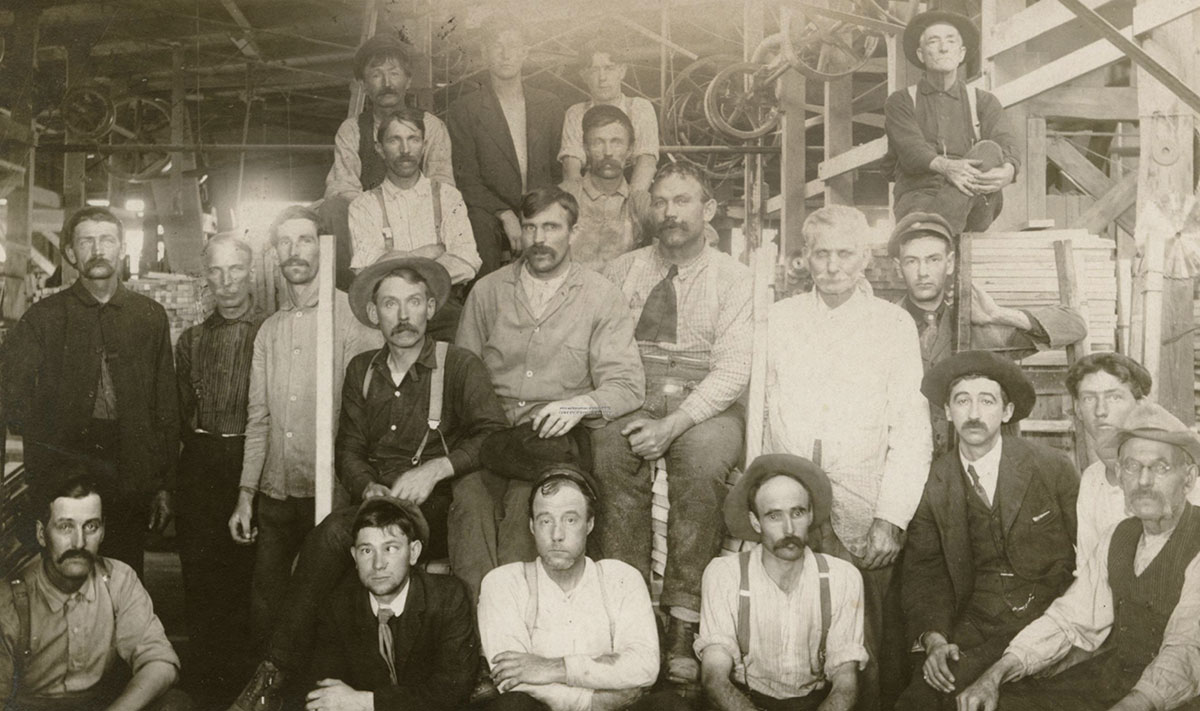
Introduced by Dick Swain
A stout drinking song with a great chorus. At least two versions of the song, both probably dating back to the 1870s, have been published and recorded. The “Shanty Song” version was collected from Mrs. Annie V. Marston of Charlestown, Maine and first published in Eckstorm and Smyth, Minstrelsy Maine (1926). The earliest version of the “Raftman’s Song (Old Butler)” I have found is in the Joel Kimball Diary, April 24, 1874, Livingston Manor, NY (Sullivan County) (accessed May 23, 2021).
The most complete version of the “Raftsman’s Song” (with words almost identical to Joel Kimball’s version) was collected by Ellen Stekert from Ezra Barhight of Gallilee, Pennsylvania and published in “Four Pennsylvania Songs Learned before 1900, From the Repertoire of Ezra V. Barhight” in Goldstein and Byington, Two Penny Ballads and Four Dollar Whiskey (1966).
The Maine version, “Shanty Song,” presented here includes lumber mill locations which would have been familiar to many itinerant mill workers and immigrants in the last quarter of the 19th century – Albany, Philadelphia, and Lewiston, Maine. The song gained a new life after verses localizing the song to the Erie Canal were written in the early 1980’s by John Mayberry, a former member of the CDSS Board and a Toronto Morris Man. Verse 4 of the version here includes my modification of one of John’s verses – it’s a good finish to an excellent song.
For more information, check out:
- “Raftman’s Song” and “Old Butler” at the Vaughan Williams Memorial Library
- “Shanty Song” at the Vaughan Williams Memorial Library
- “Shove Around the Grog” at the Traditional Ballad Index
Listen to Cliff Haslam sing “Shove Around the Jug” from his album Leaning in the Wind, © 2012 Cliff Haslam.
“Shanty Song” with additional Erie Canal verses by John Mayberry.
Listen to Dave Ruch sing “Shove Your Grog Around” from The Oldest Was Born First, 2008.“The Raftman’s Song (Old Butler)”
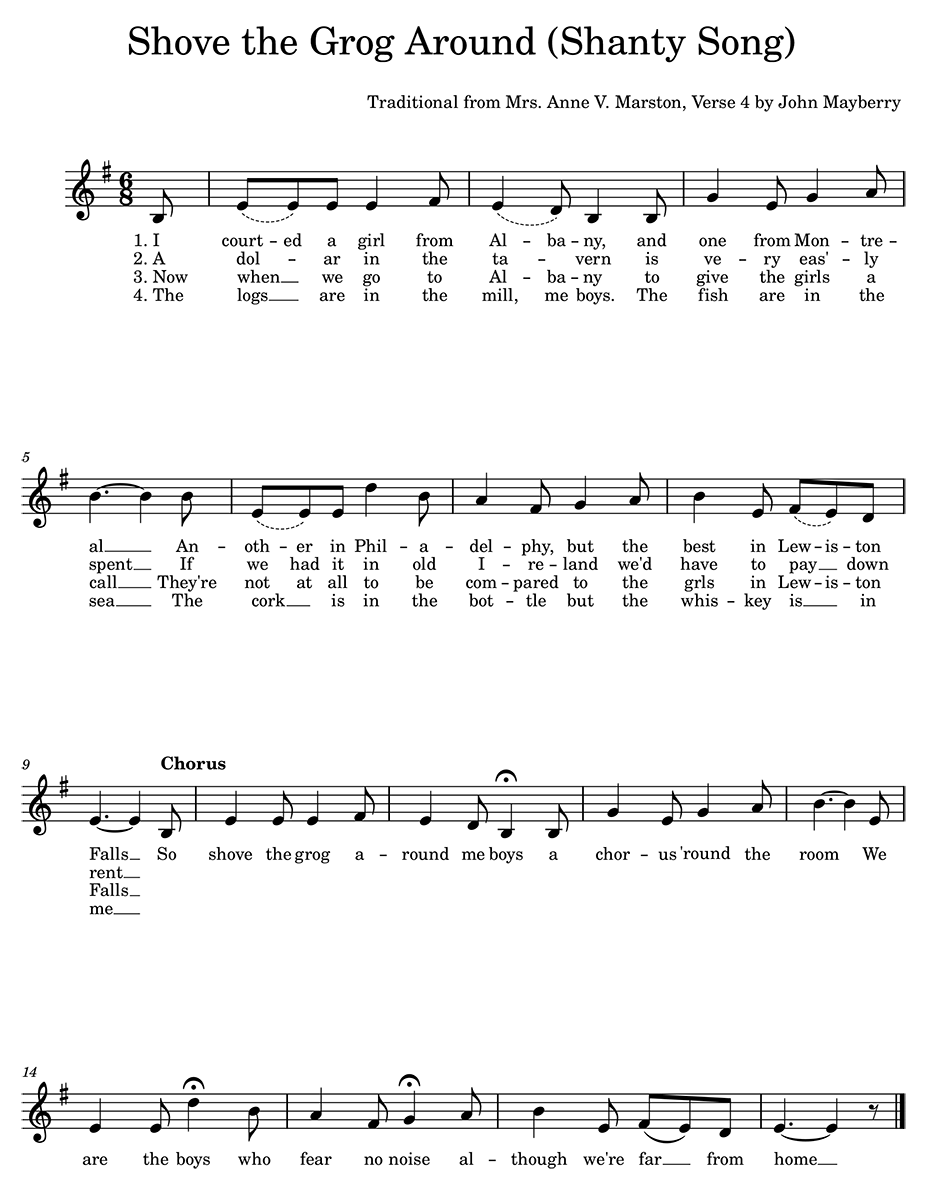
Lyrics
Eckstorm, Fanny Hardy and Mary Smyth. Minstrelsy of Maine. 1927, p. 60
Barry, Phillips. Maine Woods Songster. 1939, p. 17
Last verse by John Mayberry.
I courted a girl in Albany, one in Montreal,
Another in Philadelphia, but the best at Lewiston Falls
Chorus:
Shove the grog around me boys
A chorus ‘round the room
We are the boys who fear no noise
Although we’re far from home
A dollar in a tavern is very easily spent
If we had it in Old Ireland, we’d have to pay down rent
Chorus
When you go to Albany to give the girls a call,
They’re not at all to be compared to the girls at Lewiston Falls
Chorus
The logs are at the mill, me boys. The fish are in the sea.
The cork is in the bottle, but the whiskey is in me
About Dick Swain: Combining his skills as a librarian with a life-long interest in folk music, Dick researches and performs songs from the places he has lived and worked, including the Great Lakes Region, Pennsylvania, and Maine. He accompanied Sandy Ives on several trips to Prince Edward Island and has performed at folk festivals, museums, and libraries in the U. S. and Canada. He was Program Director of the CDSS Pinewoods Folk Music Week four times and was a staff member of the Traditional Music and Dance (TradMaD) Camp in 2017. He is especially proud that Sandy Ives signed his copy of the book Drive Dull Care Away with the words: “For Dick Swain, who sings the old come-all-ye’s the way they should be sung!”
Rad Music Moment: “Which Side Are You On?” Folksong
Learn to sing “Which Side Are You On?”:
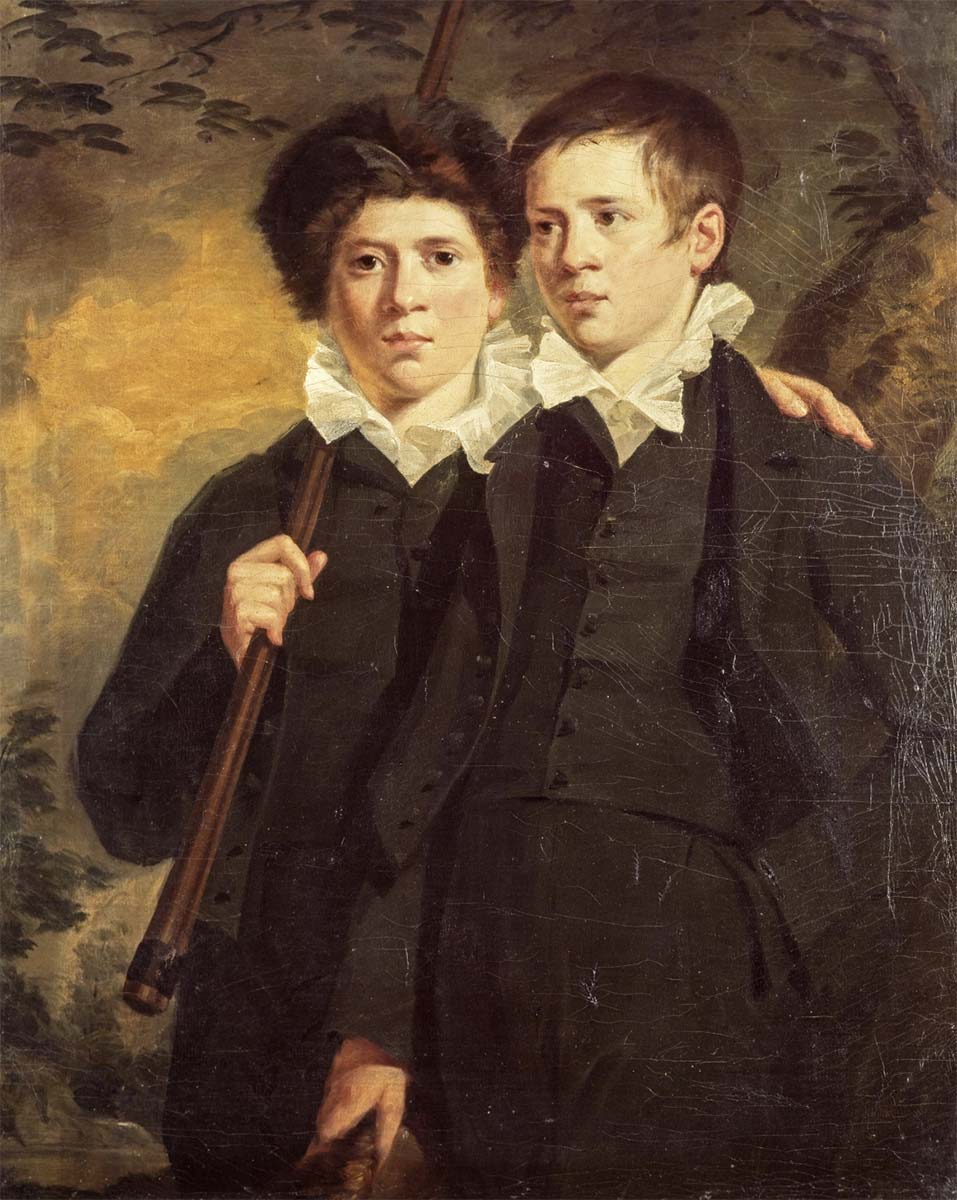
Introduced by Moira Craig
In Scotland, the law concerning the general crime of infanticide took two forms during the period 1660-1800. If a married woman (or less commonly man) was prosecuted for the killing of a newborn child, the charge would remain the common law offence of murder, unless it could be proved that the child was born healthy and that the accused had wilfully killed it.
The only chance a lower-class woman had, if she didn’t want to go into service, was to marry and to try to marry well. Unfortunately, if a girl became pregnant before marriage and the father refused to acknowledge the pregnancy, she was likely to be ostracised and banished from the family or village and her chance of marriage in the future was unlikely. It was probable that she would live a life of penury and destitution. It is not surprising, then, that women would try to hide their pregnancy and kill their babies in an attempt to continue a “normal” life.
“The Cruel Mother” exists in a number of variants, in some of which there are verses where the dead children tell the mother she will suffer a number of penances each lasting seven years, e.g. “Seven years to ring a bell / And seven years porter in hell.” Those verses properly belong in “The Maid and the Palmer” (Child ballad 21). Variants of “The Cruel Mother” include “Carlisle Hall,” “The Rose o Malinde,” “Fine Flowers in the Valley,” “The Minister’s Daughter of New York,” and “The Lady From Lee,” among others. “Fine Flowers of the Valley” is a Scottish variant. “Weela Weela Walya” is an Irish schoolyard version.
A closely related German ballad exists in many variants: a child comes to a woman’s wedding to announce himself her child and that she had murdered three children. The woman says the Devil can carry her off if it is true, and the Devil appears to do so.
Infanticide and illegitimacy have been recurrent themes in many European ballads. This version is from the Greig Duncan collection. The woman kills the babies to conceal the fact that she is no longer a virgin and of marriageable material. However, her conscience plays tricks on her and she awaits her fate.
Listen to Moira Craig singing “The Cruel Mother:”
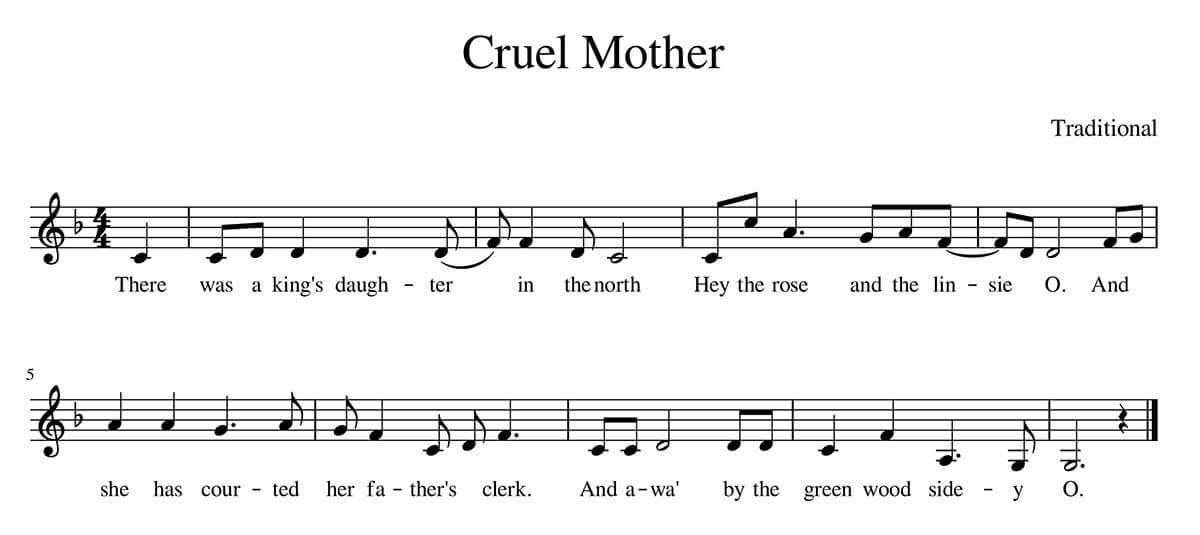
Lyrics
There was a king’s daughter in the north,
Hey the rose and the linsie O;
And she has courted her father’s clerk,
And awa’ by the greenwood sidie O.
She courted him a year and a day,
Till her appearance did her betray.
She leaned her back against a tree,
Thinking that she would lighter be.
She leaned her back against a thorn,
And bonny are the boys she has born.
She took out her wee penknife,
And she’s ta’en awa’ their twa sweet lifes.
She took the kerchief fra her neck,
And she’s wrapped them in a winding sheet.
She buried them beneath a marble stone,
Thinking to win a maiden home.
She looked owre her father’s castle wa’,
And she saw twa bonny boys playing at the ba’.
O bonny boys, gin thou were mine,
I’d dress ye in the silk sae fine,
The sovilne* and the green-grass silk
Ye’d never drink nane but the farrow cow’s milk
O mother, mother, when we were thine,
We never saw nane o’ your silk sae fine.
The sovilne and the green-grass silk;
We never drank nane o’ your farrow cow’s milk.
O bonny boys, come tell to me,
The kind of death that I’m tae dee?
Seven years a bird in the bush,
And seven years a fish in the flood,
Seven years a warning bell,
And seven years in the deeps o’ hell.
Welcome, welcome, bird in the bush,
And welcome welcome, fish in the flood.
Welcome, welcome, warning bell,
But God keep me from the deeps o’ hell.
* Sovilne: sable fur
Moira Craig writes: I was born and brought up outside of Glasgow and my home was always full of singing and music. I never thought much about it; it was normal to me. While Scottish traditional songs are my main love, I’ll sing anything at the drop of a hat and hopefully will continue to do so till the day I die.
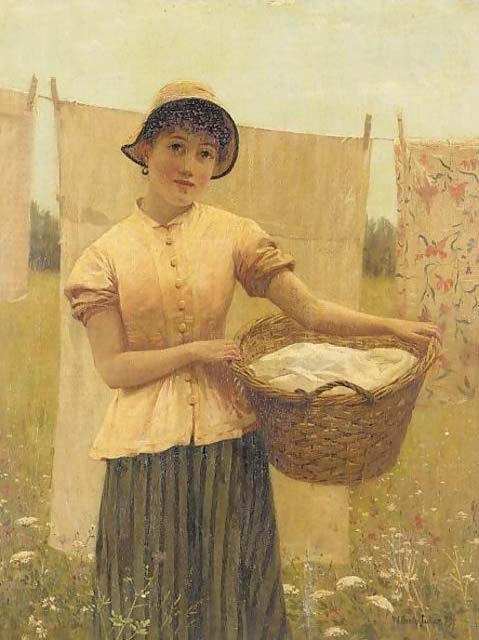
Introduced by April Grant
I first heard “Katie Catch” from Boston-area singer Gus Reid. He learned it from the singing of Fay Hield, who revived it and, I believe, slightly rewrote/combined versions from the book The Traditional Games of England, Scotland, and Ireland Volume 2 by Alice Bertha Gomme, and from Iona and Peter Opie’s Oxford Dictionary of Nursery Rhymes. It’s the kindest of songs, about sweethearts deciding to get married, and looking forward to all the good things that they’ll do together.
When I hear this song, from Gus, Fay Hield, or most recently from Rhode Island singer Cate Clifford, I almost always burst into tears. I’m not the only one, I’ve noticed. None of us can explain it except to say, “It’s so beautiful!” or “It’s the one where everything is OK!” In a genre where tragic endings and complaints make for the most gripping songs overall, sometimes our hearts cry out for one where nobody has to die and we can watch everything go well for a change.
Listen to Fay Hield sing the song on the album “Old Adam” on Spotify, or listen on YouTube below.
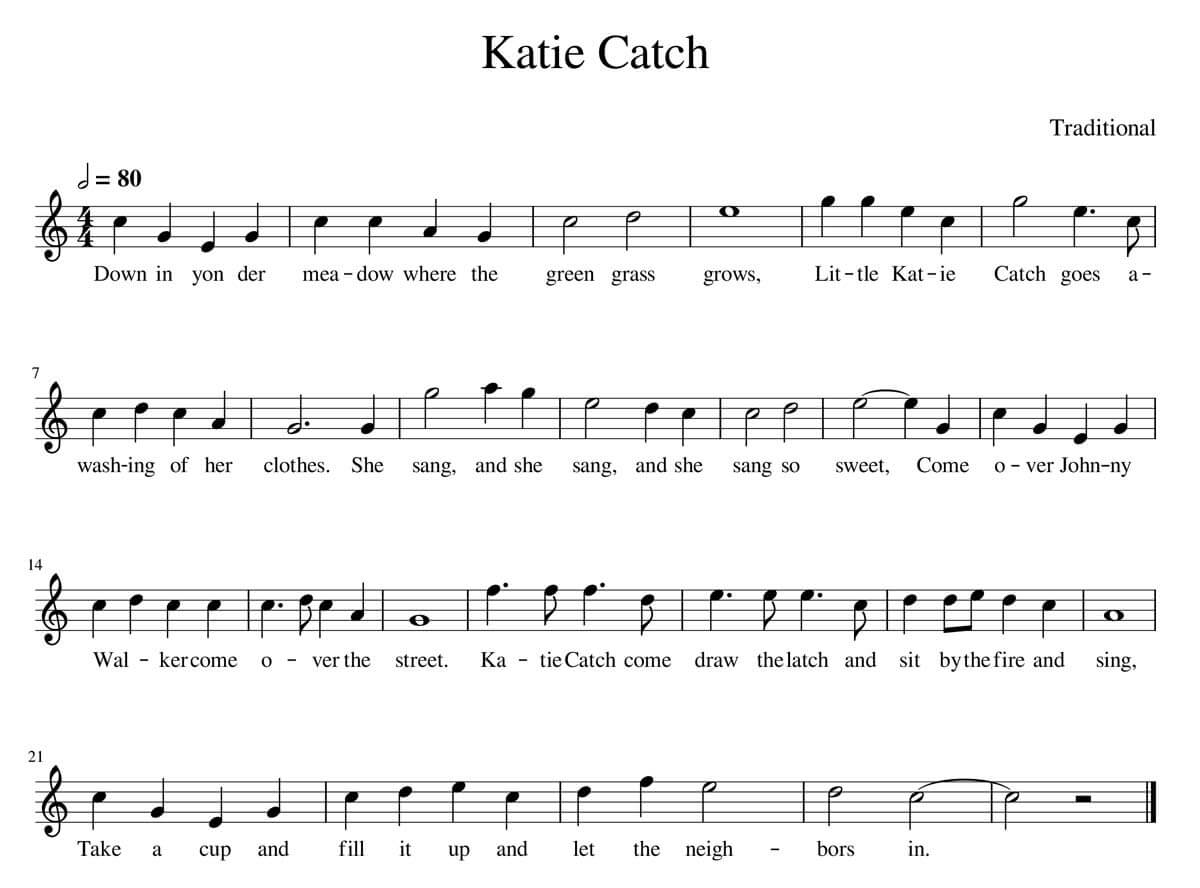
Lyrics as sung by Fay Hield:
Down in yonder meadow where the green grass grows,
Little Katie Catch goes a-washing of her clothes,
She sang, and she sang, and she sang so sweet,
Come over, Johnny Walker, come over the street.
Chorus (repeated after each verse):
Katie Catch, come draw the latch
And sit by the fire and sing,
Take up a cup and fill it up
And let the neighbours in.
Little Katie Catch she made a pudding nice and sweet,
Young Johnny Walker took a spoon for to eat.
Taste love, taste love, don’t say no,
Tomorrow we’ll be married, to the church we will go.
Bedding sheets and pillow slips and blankets and all,
A little baby on your knee and that’s the best of all.
A guinea, a guinea, a guinea gold ring,
Come take me to the church and hear the little choir boys sing.
A guinea gold ring and a peacock hat,
A penny for the church and a feather for his cap.
She paints her cheek and he curls his hair,
She kisses Johnny Walker at the foot of the stair.
April Grant writes: I’m a singer and songwriter who lives in the Boston area. During the pandemic I’ve been letting out my urge to perform by doing the occasional show over Zoom. I also write short stories and poetry. I dunno, dude, words are fun.
Hollering: An Ancient Musical Tradition!
Learn to holler:
Learn Sea Songs: History, Origins and Resources on Shanty Music:
Learn to sing “Roll the Old Chariot Along:”

Introduced by Cate Clifford
“A Pilgrim’s Way” began as a Rudyard Kipling poem which, according to Mainly Norfolk, appeared in his book The Years Between. Then Peter Bellamy added his original tune.
When I first heard this love letter to humanity, sung by A.J. Wright, I felt like I’d heard my own heart in song. May it lighten and strengthen yours.
The Amorites were a semi-nomadic people who lived in Mesopotamia, Palestine, and Syria during the 3rd millennium BC. They founded the ancient city of Mari, and the first dynasty of Babylon. Eremites are Christian hermits. A “general averagee” is a sailor on a cargo ship.
Listen to Peter Bellamy performing “A Pilgrim’s Way:”
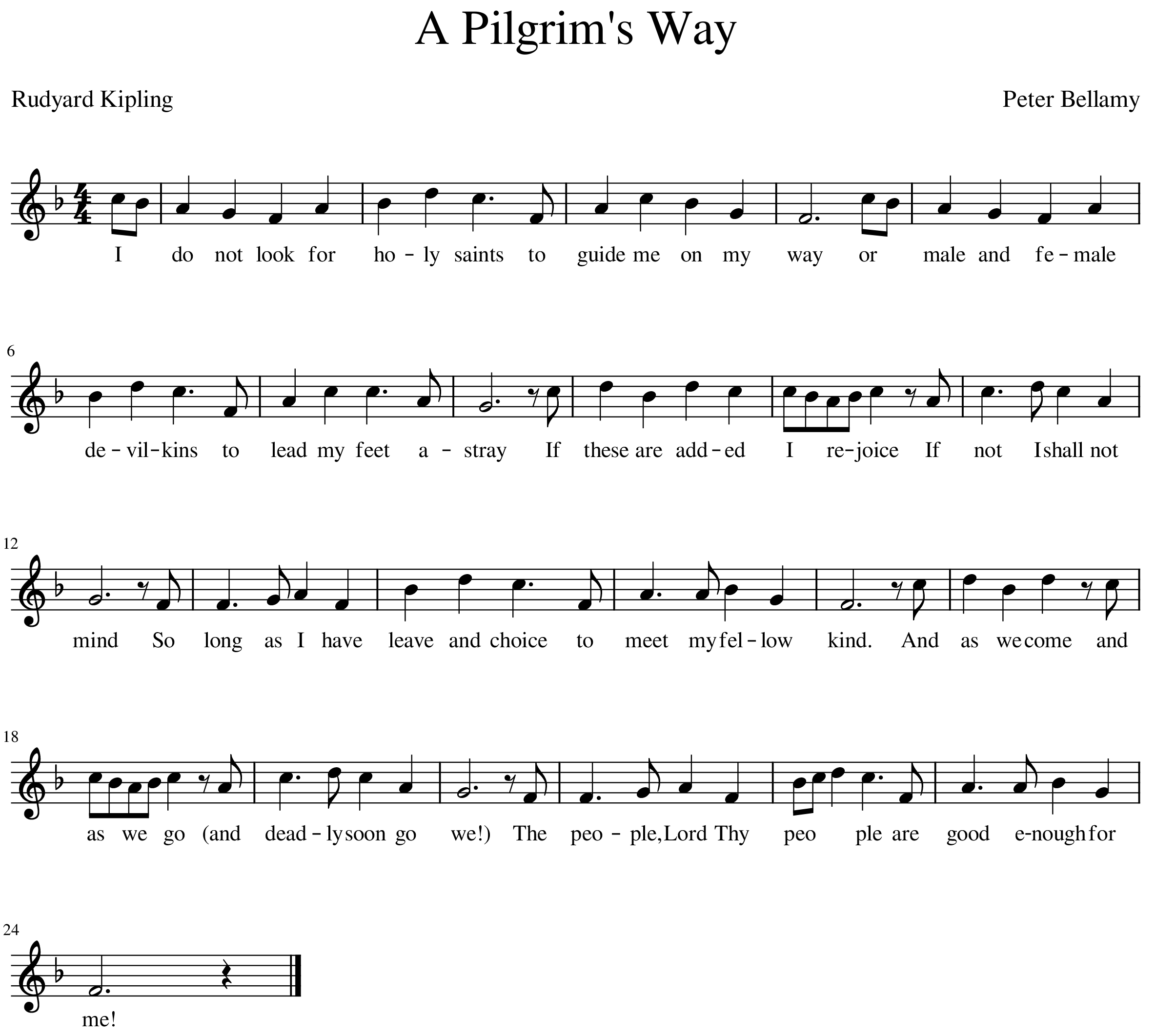
Lyrics
I do not look for holy saints to guide me on my way,
Or male and female devilkins to lead my feet astray.
If these are added, I rejoice—if not, I shall not mind,
So long as I have leave and choice to meet my fellow-kind.
And as we come and as we go (and deadly-soon go we!)
Chorus: The people, Lord, Thy people, are good enough for me!
Thus I will honour pious men whose virtue shines so bright
(Though none are more amazed than I when I by chance do right),
And I will pity foolish men for woe their sins have bred
(Though ninety-nine per cent. of mine I brought on my own head).
And Amorite, or Eremite, or General Averagee,
Chorus: The people, Lord, Thy people, are good enough for me!
And when they bore me overmuch, I will not shake mine ears,
Recalling many thousand such whom I have bored to tears.
And when they labour to impress, I will not doubt nor scoff;
Since I myself have done no less and—sometimes pulled it off.
Yea, as we are and we are not, and we pretend to be,
Chorus: The people, Lord, Thy people, are good enough for me!
And when they work me random wrong, as oftentimes hath been,
I will not cherish hate too long (my hands are none too clean).
And when they do me random good I will not feign surprise.
No more than those whom I have cheered with wayside courtesies.
But, as we give and as we take—whate’er our takings be—
Chorus: The people, Lord, Thy people, are good enough for me!
But when I meet with frantic folk who sinfully declare
There is no pardon for their sin, the same I will not spare
Till I have proved that Heaven and Hell, which in our hearts we have
Show nothing irredeemable on either side of the grave.
For as we live and as we die—if utter Death there be—
Chorus: The people, Lord, Thy people, are good enough for me!
Deliver me from every pride—the Middle, High, and Low—
That bars me from a brother’s side, whatever pride he show.
And purge me from me all heresies of thought and speech and pen
That bid me judge him otherwise than I am judged. Amen!
That I may sing of Crowd or King or road-borne company,
That I may labour in my day, vocation and degree,
To prove the same by deed and name, and hold unshakenly
(Where’er I go, whate’er I know, or whoe’er my neighbor be)
This single faith in Life and Death and to Eternity:
Chorus: The people, Lord, thy people are good enough for me!
Cate Clifford is a Rhode Island-based singer of traditional and trad-adjacent folk songs who has performed in homes, venues, and festival showcases across New England and New York, and is featured on Lynz Morahn’s EP Kick It Off. When she isn’t singing, Cate collects traditional songs of Robin Hood and King Arthur, traditional and trad-adjacent folk songs about love beyond the romantic and libidinous, and little songs (with Ben Gagliardi); schemes about how to fit more Shakespeare into her setlists; and serves on the Portsmouth Maritime Folk Festival board. For more about Cate and the songs she loves, visit her website.
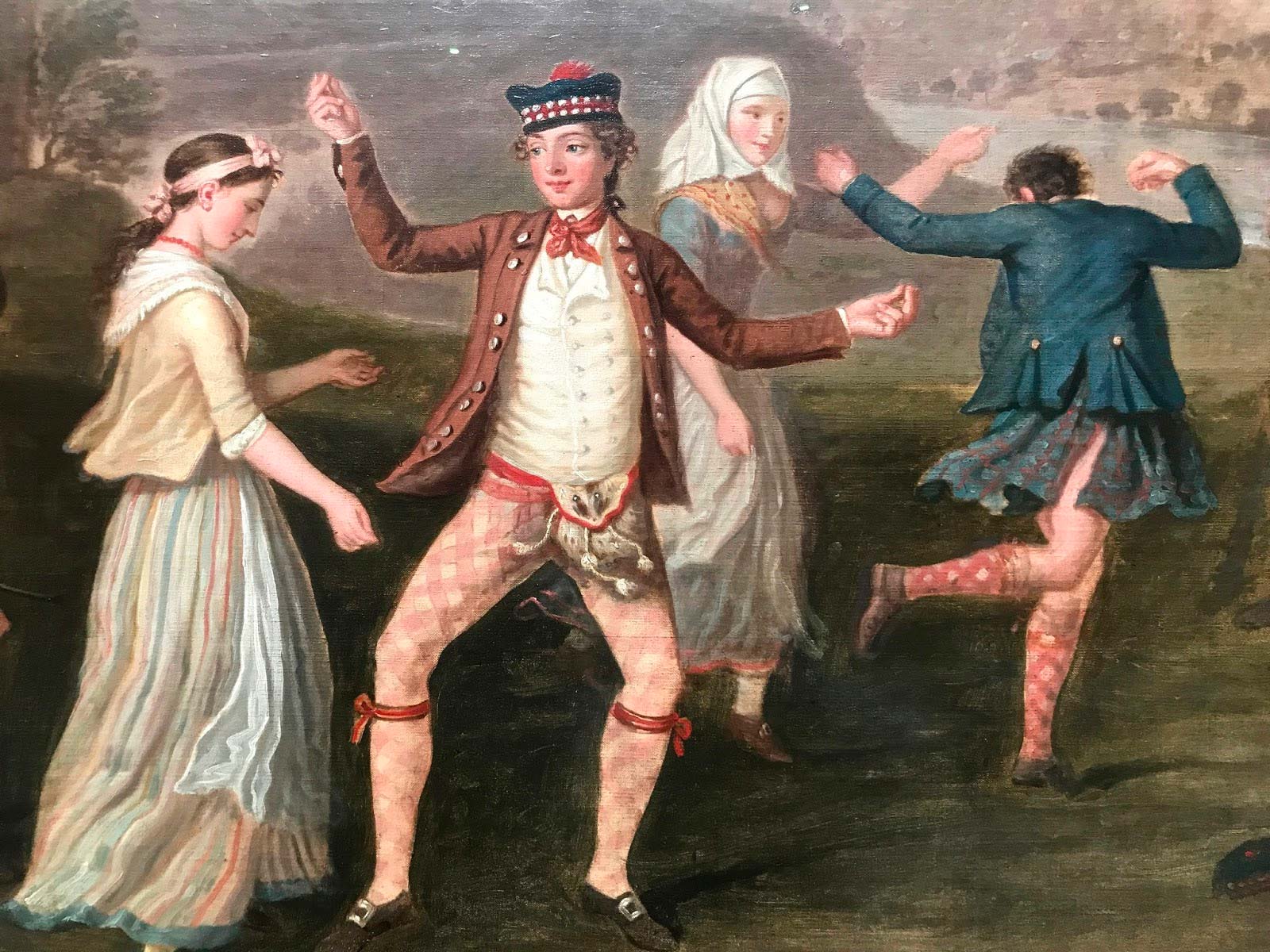
Introduced by Jeff Gillett
Glenlogie, or Jean O Bethelnie is No. 238 in the Child Collection. The earliest text in Child dates back to 1768.
It is a ballad with a happy ending, but perhaps none the worse for that! There is no murder, no rape, no incest: the most sensational element is emotional blackmail. The young Lady Jeannie sees Glenlogie and falls head-over-heels in love with him. When he says he is already promised to another, she takes to her bed and prepares to die for love. Glenlogie relents, they are married and (we suppose) live happily ever after!
The tune that I know best for it was written by Shirley Collins, and I loved it from the moment Ron Taylor first introduced me to it.
I have a particularly soft spot for the song because it was one of the earliest for which I was happy with my own attempts at finding a way of accompanying traditional song that might enhance the vocal performance without restricting it in any way.
Here is the recorded performance of Glenlogie by Ron Taylor and myself (also featuring my other long-term collaborator, Becky Dellow on the fiddle), which is taken from our Wildgoose CD Buy it, Try it (and Never Repent You).
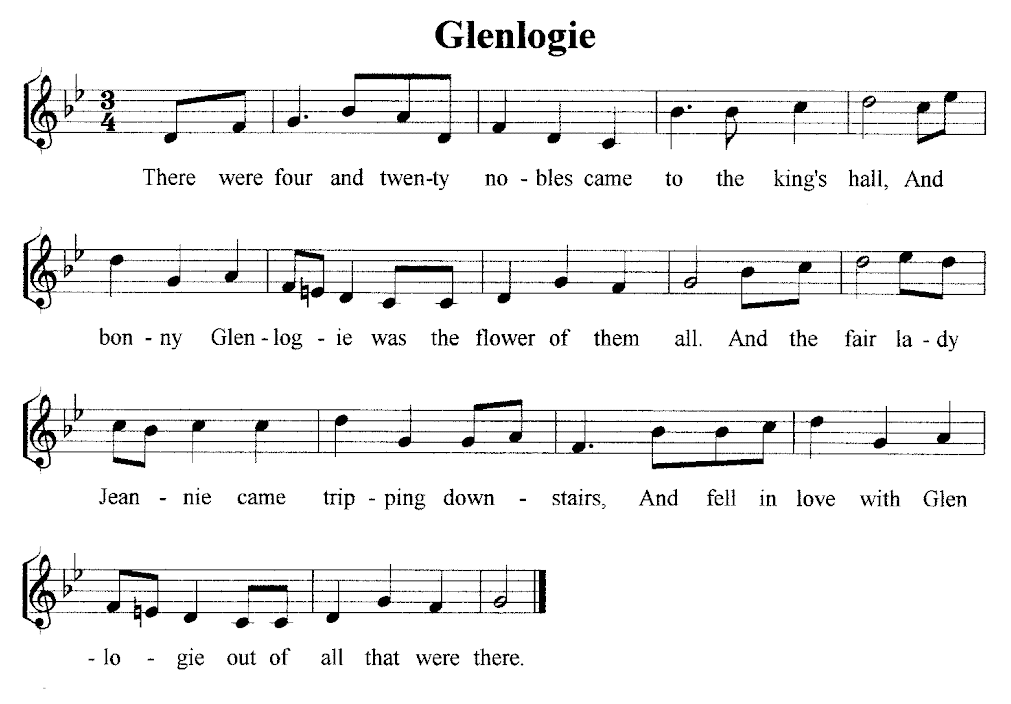
Lyrics
There were four and twenty nobles came to the king’s hall,
And bonny Glenlogie was the flower of them all.
And the fair Lady Jeannie came tripping downstairs
And fell in love with Glenlogie out of all that were there.
She sent for the footman that ran by his side,
Saying: ‘Who is that young man, and where does he bide?’
‘He bides at Glenlogie when he is at home,
And he’s of the gay Gordons; and his name is Lord John.’
‘Glenlogie, Glenlogie, and you would prove kind,
I have laid my love on you, I’m sure in my mind.’
But he’s turned around lightly, as the Gordons do all,
Says: ‘I thank you, Lady Jeannie, but I’m promised away.’
She’s sent for her ladies her bed for to make
And the rings on her fingers, she did them all break;
Saying: ‘Is there a bonny boy that would win hose and shoon
That would ride to Glenlogie and bid my love come?’
When Glenlogie saw the letter, a loud laugh laughed he.
But when he had read it, the tears blinded his eye;
Saying: ‘What is my lineage, and what is my make
That such a bonny lady should die for my sake?’
When he’s come to the castle, little mirth there was there
But weeping and wailing and tearing of hair.
And pale and wan was she when Glenlogie came in;
Ah, but red and rosy grew she when she saw it was him!
‘Turn around, Lady Jeannie, turn around to my side
For I’ll be the bridegroom, and you’ll be my bride!’
And it was a merry wedding – all silver and gold –
For bonny Jeannie Gordon, just seventeen years old.
Jeff Gillett writes: My interest in folk music dates back to my childhood, when my parents introduced me to the music of Pete Seeger and Joan Baez. I later discovered Martin Carthy and began to explore folk music from the UK. I have a great deal of sympathy for those who regard folksong as an essentially unaccompanied form, and have devoted my own efforts as singer and accompanist to finding an approach that supports the song without swamping it.
I performed with Ron Taylor intermittently for about 30 years, concurrently working in largely instrumental line-ups with fiddle-player Becky Dellow (culminating in Mischief Afoot). I have appeared on albums by Jim Causley, Martin and Shan Graebe, Craig Morgan Robson and Marianne McAleer, and was also in a duo with Sarah Morgan. Currently, I perform solo and with Elaine Gillett as Discovery.
I play guitar, mandolin, mandola, English concertina and Appalachian Mountain dulcimer.

 Thanks to the Massachusetts Cultural Council for their generous support.
Thanks to the Massachusetts Cultural Council for their generous support.